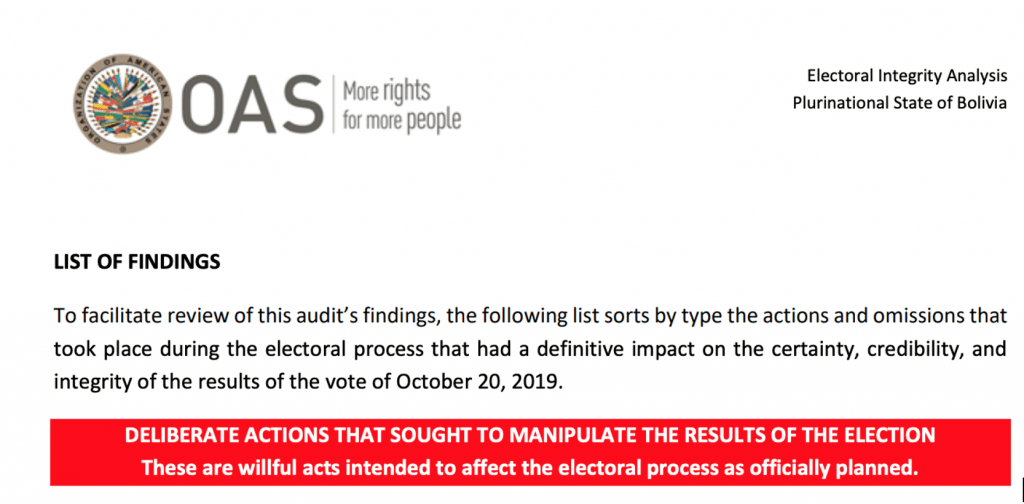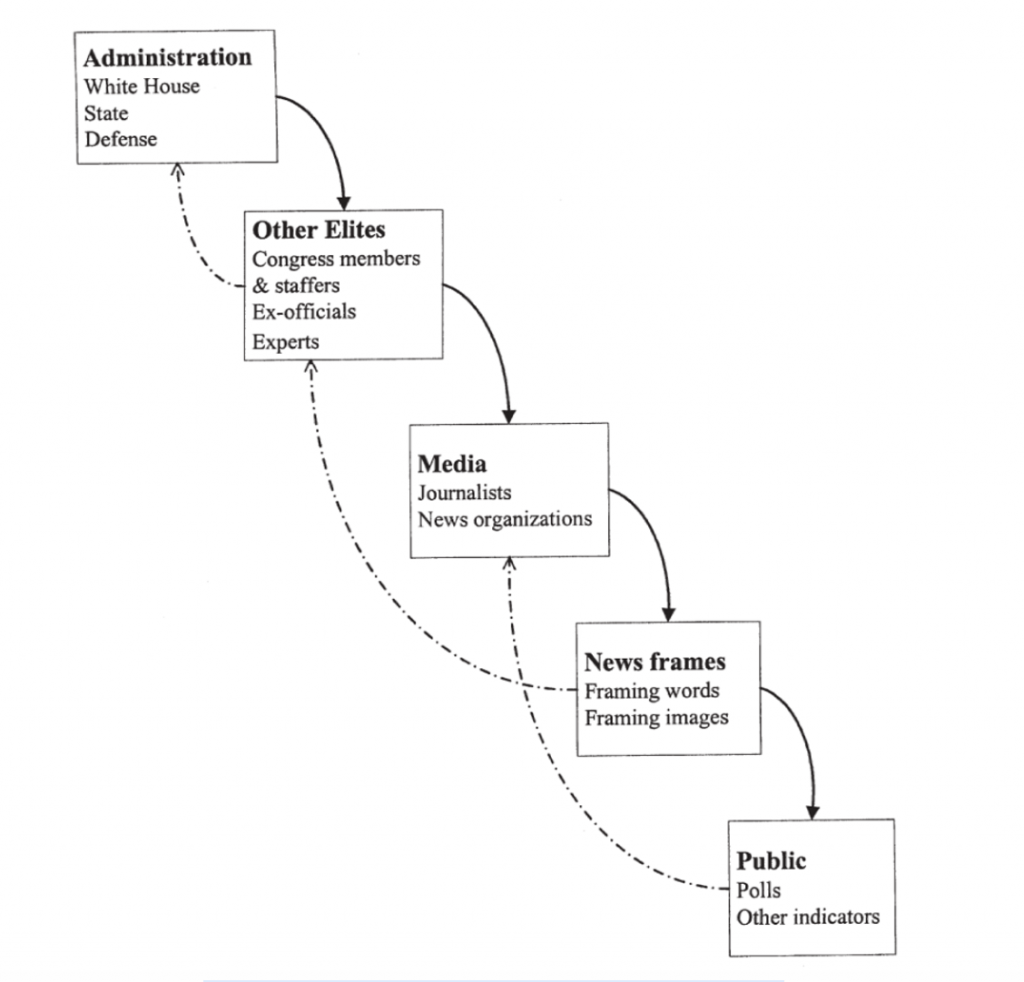By Ben Gutman, MA Global Communication ’22
Throughout the Cold War, U.S. presidential administrations and other federal departments weaponized the idea of anti-communism to dominate media frames and discourage dissent. U.S. government officials have successfully employed a “spread of democracy” frame to justify proxy wars, covert intervention, and regime change against leftist Latin American governments with developing democratic processes. This frame has facilitated the projection of the U.S. master narratives of American exceptionalism and free-market capitalist individualism onto other sovereign nations.
One useful way of understanding narrative contests is Entman’s Cascading Activation Model, which describes how government frames are pushed down to other elites, news organizations, and the public. Entman uses the real-world cascading waterfall metaphor to highlight the hierarchical stratification of the cascade, which makes it easier to spread frames down the cascade rather than up.
Following the U.S. invasion of Iraq in 2003 and an increase in U.S. interventionism in the Middle East, the U.S. paid less attention to Latin America. This allowed many Latin American countries like Bolivia to develop their democratic political systems. The strengthening of Bolivian representative democracy was highlighted by President Evo Morales’ creation of the Plurinational state in 2009, which guaranteed political representation to all indigenous Bolivians. A relatively healthy democratic process in a socialist state with control of valuable natural resources like Bolivia, presented multiple narrative contestation problems throughout the U.S. government’s quest for regime change, despite access to elite institutions used to spread its frame of choice: election fraud.
Narrative used to justify U.S-backed coup in Bolivia met with undeniable contestation
First, the U.S. state narrative found pervasive contestation through informational content produced by academics, progressive journalists, and non-profit organizations within the Western and Bolivian media ecology. On Oct 20, 2019, the U.S. proxy Organization of American States (OAS) issued a report alleging “intentional manipulations” and “serious irregularities” in the Bolivian presidential election of Evo Morales.

These claims were immediately debunked and repeatedly proven to be a false narrative designed to endorse an anti-democratic seizure of power. The election fraud narrative was in congruence with mainstream media motivation and uncritically re-published by the New York Times. On Nov 10, 2019, Jeanine Áñez’ white supremacist, Christian neo-fascist dictatorship took power in a military junta.
Second, despite U.S. domination over Western media infrastructure, viral social media content of violent government oppression contested the pro-democracy U.S. narrative. Throughout eleven months of economic mismanagement, extreme corruption, and brutal repression against indigenous protesters resulting in dozens of extrajudicial murders, the U.S. state narrative grew less and less compelling. However, Secretary of State Mike Pompeo continued to voice strong support for the military coup and the “return of democracy”, the OAS continued to deny its involvement, and Western mainstream media continued to whitewash the Áñez regime’s crimes.
While the messaging campaign was successful in its short-term regime change goals, it was unsuccessful in its impact on Bolivian public opinion and international solidarity with the Bolivian people. Mass public uprisings and grassroots worker movements forced new elections and on Oct 18, 2020 another socialist, Luis Arce, was elected.
Continued pro-coup regime narrative hampers Bolivian drive towards justice
Despite frame contestation from influential voices in the Western media ecology and emotional-triggering online content displaying the coup regime’s savagery, the vast majority of mainstream publications continued to reinforce a damaged and hypocritical pro-democracy U.S. narrative. On March 13, 2021, Bolivian authorities arrested Áñez and charged the coup leader with terrorism and sedition, the same charges previously levied by Áñez against former president Morales. Two days later, the OAS released a statement expressing concern “about the abuse of judicial mechanisms” as a “repressive instrument of the ruling party”.

This narrative of “rule-breaking” and “revenge”, revolving around the Áñez arrest, functioned as another anti-democratic assault against an elected socialist government and its ability to exercise sovereign control over its rule of law. On March 18 the Washington Post Editorial Board wrote that “Mr. Arce appears to have reverted to a more one-sided and vengeful leadership style characteristic of Mr. Morales” and referred to Áñez as the “conservative then-interim president”.
A March 15 CNN analysis mentions the invalidation of the 2019 election results, but fails to include any reference to the invalidation of the report used to invalidate the election results. The article continues with a section titled “vague charges” that characterizes the charges against Áñez as “broad” with “proof scant”. However, an Áñez decree that gave immunity to all deployed military personnel culminated in the massacre of more than thirty protesters, in addition to a plethora of other human rights abuses.
The blatant dishonesty and bad faith framing from mainstream media sources on Bolivia is rooted in the U.S. government and OAS’s persistent use of the same pro-democracy narratives that yield anti-democratic results. The OAS has never admitted to its role in the 2019 coup, has never apologized to the Bolivian people, and has even continued to spread misinformation on the Bolivian political process. Unfortunately, Biden’s State Department under Secretary of State Antony Blinken has continued to weaponize the U.S. master narratives of “democracy” and “human rights” to persecute a perceived hostile government for its role in attempting to deliver justice for the victims of the coup’s violent crackdown.
Recommendation
The Biden administration’s State Department should stop reinforcing a heavily contested framing of the Áñez arrest as a human rights and due process issue. This frame has cascaded to mainstream media, which continued an unconvincing pro-coup regime narrative. This narrative violates the Arce government’s sovereign democratic right to prosecute Áñez in accordance with Bolivian law and helps deny Áñez’ victims justice, but also adds to an increasing resentment from Latin Americans towards “pro-democracy” US interventionism.
The opinions expressed in this blog are those of the author. They do not express the views of the Institute for Public Diplomacy and Global Communication or the George Washington University.



